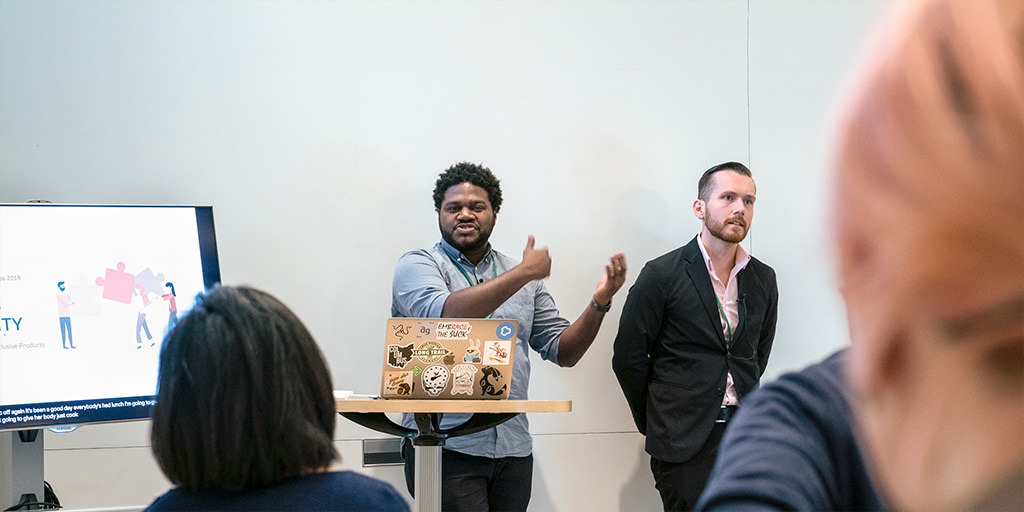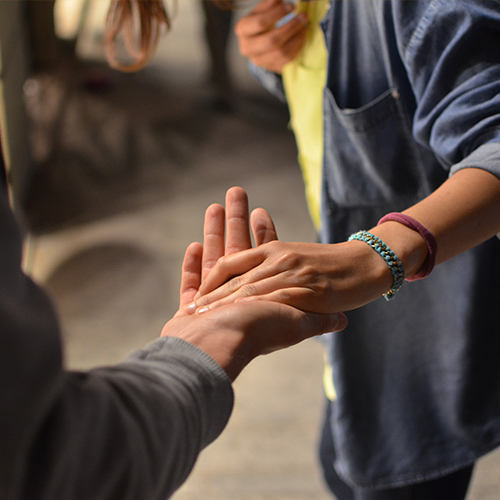On Saturday, November 2nd, 2019 Cantina had the honor of sponsoring, attending, and speaking at a11ybos 2019. At this annual event, the Boston accessibility community gathers for one day a year to talk about the changing tide in favor of accessibility, discuss wins and challenges, and elevate practices of inclusivity and accessibility.
2019 has been an interesting year for accessibility, diversity, and inclusion. Domino’s recently lost their court case challenging whether the Americans with Disabilities Act (ADA) applies to their digital properties. The loss gives accessibility advocates in the United States cause to celebrate and highlights the need for corporations to take action. We’ve also seen growing outrage over bias in artificial intelligence (AI) towards people who look like its creators, and concerns that a fixation on AI bias leaves those with accessibility needs too far behind. Accessibility is becoming more visible than ever, as advocates and media shine a light on the gaps where companies fail to build inclusive products and discriminate against users.
In a positive move, further highlighting this shift, brands as big as Nike, Starbucks, Apple, and Barclay’s double down on inclusive design principles by weaving it into the very fabric of their products. In September, Vimeo announced that updates to their player will meet WCAG (Web Content Accessibility Guidelines)’s AA standards. Mozilla, Google, and Microsoft have all moved to make their web browsers and products accessible to a broader range of individuals. And earlier in July, Vox Media announced a series of changes to make their publications friendlier to everyone.
We hosted a session on “Frameworks and Methods for Inclusive Products.” Cantina cherished the opportunity to listen to accessibility advocates, students, and industry peers on a wide range of topics. Here are a few of our observations from the weekend, along with a short recap of our talk.
Watch the highlights of our talk at a11yBos:
If you’re interested in watching the full version: follow this link.
Organizations are still struggling to make inclusivity a part of their DNA.
We were delighted to see several businesses at a11ybos 2019 who have a foundation rooted in accessible products. The diversity of speakers and attendees was also refreshing and exciting. It was particularly inspiring to hear Rich Caloggero, an accessibility specialist for MIT, talk about the testing experience for those with impairments. Our host, Fidelity Investments, was also noteworthy, both for hosting the event and for their Office of Customer Accessibility. With this office, Fidelity has made a tangible commitment to their customers to keep their products and services accessible to every customer, regardless of need. Other businesses such as Microsoft, IBM, and AT&T have shown their commitment to accessibility at the C-suite level through the creation of Chief Accessibility Officers.
However, it’s clear that this is a continuing journey, and we have to do better. In many organizations, the conversation still revolves around starting the journey. Accessibility and inclusion may be words that the team knows about, but making the business case to prioritize resources and time to the cause is still the foundational need. This is a challenge for anyone looking to bring not only greater accessibility, but greater diversity and inclusion to their product teams.
Work with students to broaden your reach.
The aforementioned diversity in attendees also meant we spoke with allies at all levels — from students to storied professionals. The message from the latter was clear — students are the future. Those just starting in web and digital product careers are learning how to develop inclusive products from the start. This is a sea change in our industry that isn’t going away.
We heard several speakers mention working closely with students for accessibility testing and user research. This is mutually beneficial when students are able to learn more about the industries they’re about to enter, and organizations gain access to a broader group of people to provide insights and feedback than exclusively their existing customers.
If you don’t write it down, it won’t happen.
Every organization is looking to continually adapt and stay financially viable. Convincing your business to prioritize accessibility and inclusivity is challenging in an environment where every priority is scrutinized.
Some advice from the Cantina allies? Start a backlog of things we don’t know yet. Tracking open questions and reviewing their potential impact on customers or the business is a common exercise in risk management, which is what those “Things We Don’t Know Yet” represent. This will help your product team understand the priorities of the researchers and designers in your organization. Furthermore, be sure to document assumptions and questions your team has as new features are built. By being transparent with your company about what you do and don’t know, you can begin building into your process opportunities to chip away at your accessibility debt.
Accessibility for the rest of us.
Being inclusive is a challenge that never ceases. In fact, it’s one that many companies will choose to bury their heads to avoid. How can designers, engineers, and product managers (especially those starting out) possibly hope to convince these large corporations to change their priorities towards what’s accessible and inclusive for all?
Start small. Work on individual components and flows as your team churns through your backlog. At the same time, work as a team to build inclusive practices into your design process. Ask yourself some of the questions we posed during our talk:
- How can we “blur the edges” of our personas?
- Who do we need to get into the room to build this for more people?
- Who are we excluding?
- What are the unintended consequences of this design choice?
- What can we tackle right now?
- How can we keep ourselves accountable?
- Where are the exit ramps? Can I undo things?
- Do any algorithms require any human intervention?
Once you’ve decided to have radical candor with yourselves and have assembled an expert team of passionate allies, you’ll find that advocating for accessibility to be prioritized in your organization is easier than you think.
Want to know more about inclusive design and frameworks for accessible products? Give @coreyaroth or @randolphduke2nd a shout on Twitter, or contact Cantina for more information.


